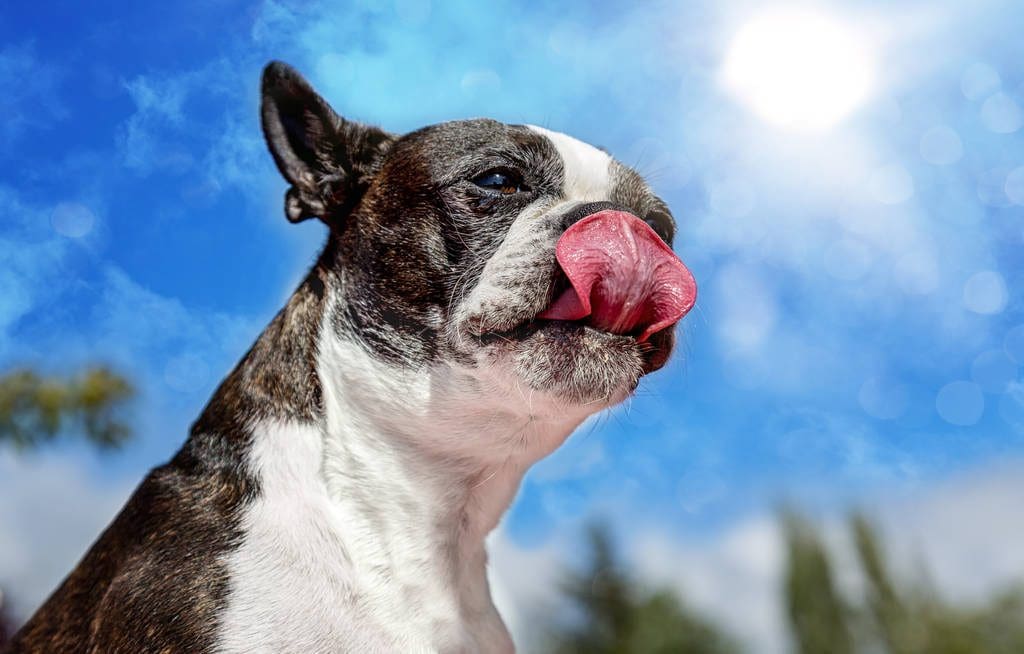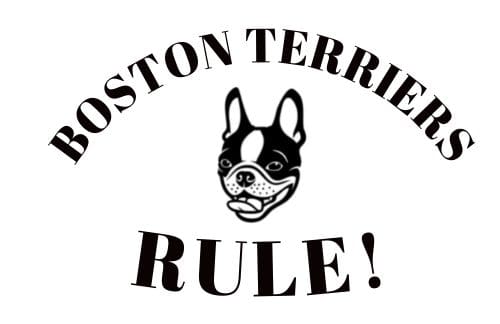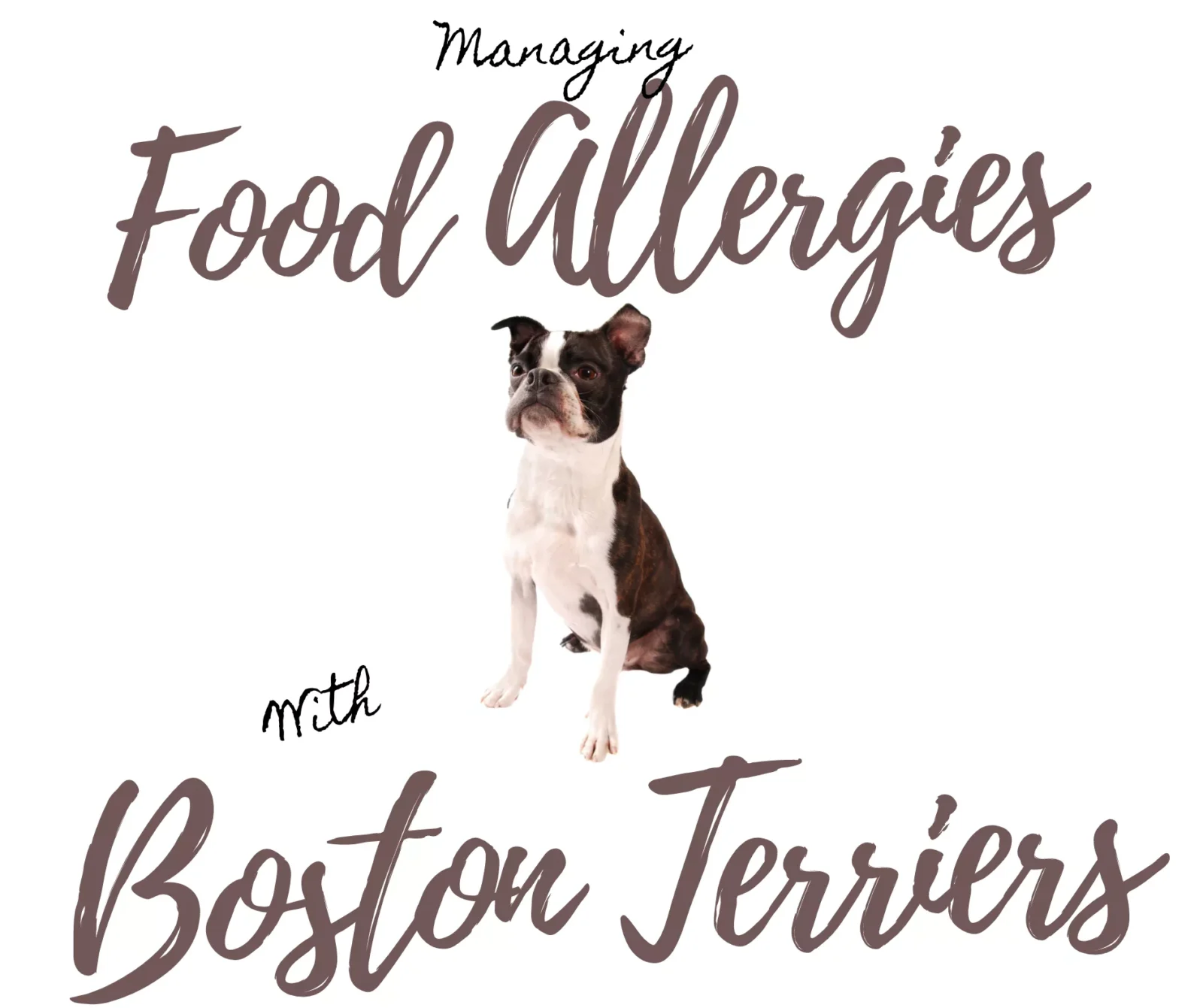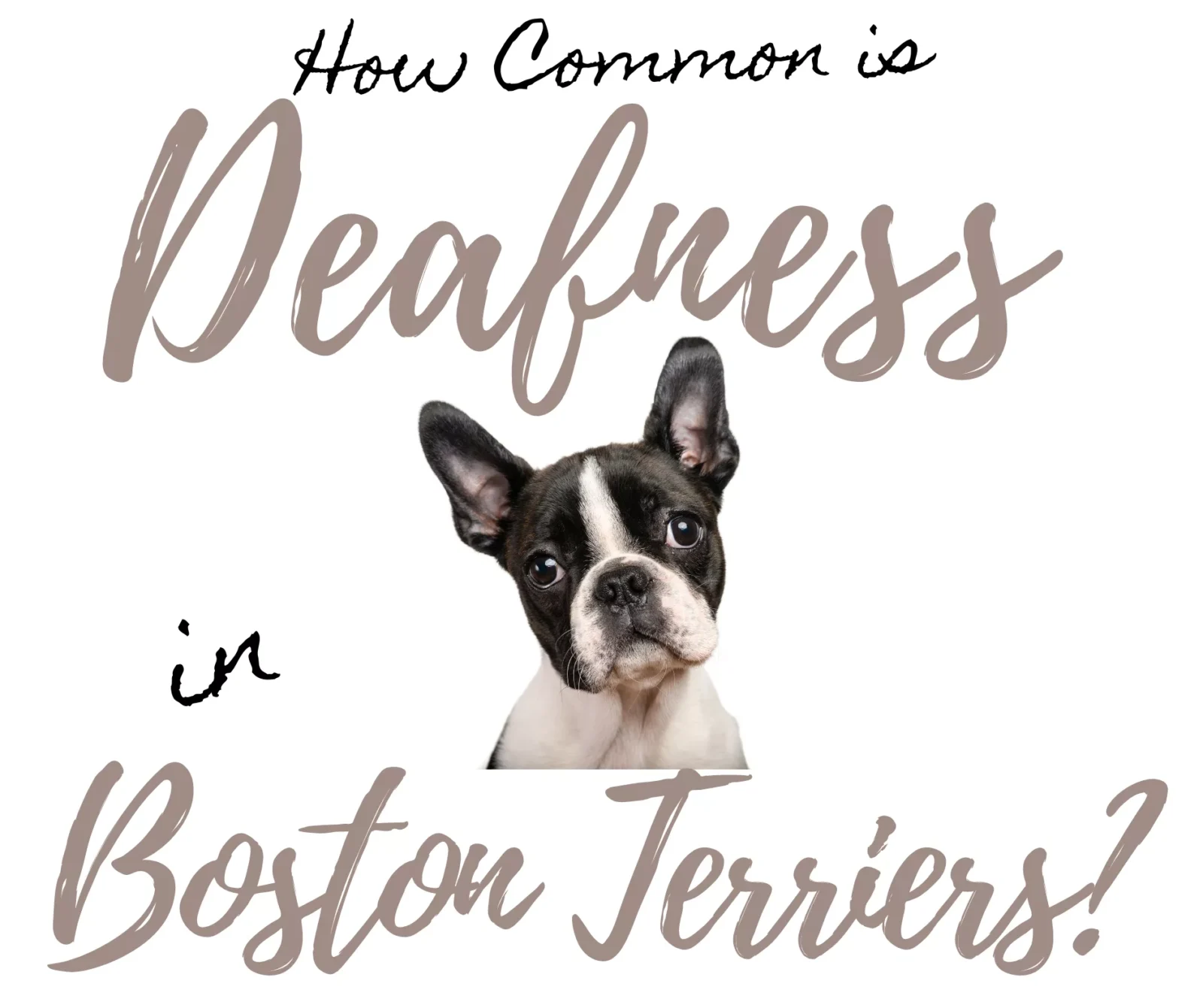Introduction
Boston Terriers, also known as “American Gentlemen,” are popular small-sized dogs known for their friendly disposition and affectionate nature. However, like many other breeds, Boston Terriers can suffer from food allergies, a common concern among pet owners.
In this article, I will discuss food allergies in Boston Terriers, addressing questions regarding their predisposition to food allergies, suitable diets, and strategies to help manage allergies, common symptoms, and recommended products to alleviate these symptoms.
If you’d like to read more on Boston Terrier allergies, click here.
Are Boston Terriers Prone to Food Allergies?
Yes, Boston Terriers are prone to food allergies, although not all dogs within this breed will experience them. Food allergies occur when a dog’s immune system reacts negatively to certain ingredients found in their diet. Common allergens include proteins like beef, chicken, wheat, corn, soy, dairy, and eggs. Boston Terriers, like many other breeds, can develop sensitivities or allergic reactions to these substances, which can manifest in various ways.

What Food Is Best for Boston Terriers?
Selecting the appropriate food for your Boston Terrier is vital in managing and preventing food allergies. Opt for high-quality dog food that is specifically formulated for small breeds and is free from common allergens.
Look for a limited ingredient diet that includes a single source of protein and carbohydrate, which can help identify and eliminate potential allergens from their diet.
Consulting a veterinarian to determine the best food for your Boston Terrier is highly recommended. They can offer guidance based on your dog’s specific needs, taking into account factors such as age, size, activity level, and any existing health conditions.
4 Ways to Help a Boston Terrier with Food Allergies
Helping your Boston Terrier manage allergies involves a multi-faceted approach that includes dietary adjustments, regular grooming, and environmental management.
Start by identifying and eliminating potential allergens from your Boston Terrier’s diet. Opt for hypoallergenic or limited ingredient dog food that avoids common allergens. Monitor your dog’s response to the new diet and make adjustments as needed in consultation with your veterinarian.
1.Dietary Adjustments
Dietary adjustments are pivotal in ensuring the well-being of your Boston Terrier. It’s crucial to pinpoint any potential allergens that might be present in your dog’s current diet.
Common allergens for dogs can include ingredients like certain grains, dairy, soy, or specific proteins.
Transitioning to hypoallergenic or limited ingredient dog food can significantly reduce the likelihood of allergic reactions. These specialized diets are carefully crafted to exclude common allergens, making them a safer choice for dogs with sensitivities.
Additionally, keeping a close eye on your dog’s response to the new diet is essential. Your dog’s reactions, whether positive or negative, will provide valuable insights for making further adjustments. Regular consultation with your veterinarian throughout this process ensures that the dietary changes are appropriate and beneficial for your Boston Terrier’s health.
Regular monitoring and adjustments in your Boston Terrier’s diet are fundamental steps towards ensuring a healthy and happy canine companion. Not only does it involve removing potential allergens but also observing how your dog responds to the modified diet.
Monitoring should encompass observing changes in their skin, coat, digestion, energy levels, and overall behavior. Any signs of improvement or exacerbation should be noted and discussed with your veterinarian. Based on their recommendations, you may need to fine-tune the diet, potentially incorporating or excluding specific ingredients to find the optimal nutritional balance that suits your Boston Terrier’s unique needs.
A well-managed and carefully tailored diet can greatly contribute to your dog’s overall health and alleviate discomfort caused by allergies or dietary sensitivities.
2. Regular Grooming:
Regular grooming is essential to maintain your Boston Terrier’s skin and coat health. Bathing them with hypoallergenic shampoos and brushing their coat can help reduce allergens and minimize skin irritation.
In addition to managing food allergies, regular grooming is a fundamental aspect of caring for your Boston Terrier. Grooming helps in keeping their skin and coat healthy, which is especially important for dogs with allergies as skin issues often accompany food sensitivities.
Hypoallergenic shampoos are designed to be gentle on sensitive skin and can aid in reducing allergens that might exacerbate skin irritations. Brushing their coat regularly not only keeps it free from dirt, but also helps in distributing natural oils, promoting a lustrous and healthy coat. Overall, integrating a routine grooming regimen into your Boston Terrier’s care routine can contribute to their comfort, appearance, and overall well-being, particularly for those prone to allergies.
3. Environmental Management:
Minimize exposure to environmental allergens such as pollen, dust mites, and mold. Keep their living space clean and use air purifiers if necessary. Regularly wash their bedding and clean their living area to reduce potential irritants.
In the realm of food allergies, environmental management plays a crucial role in alleviating symptoms and preventing allergic reactions. Beyond direct ingestion, environmental allergens can exacerbate food allergy symptoms and complicate management.
Minimizing exposure to common environmental triggers like pollen, dust mites, and mold is paramount. Ensuring a clean and controlled living space is essential for individuals with food allergies. Regular cleaning routines, including washing bedding, vacuuming, and thorough dusting, can significantly reduce potential irritants that may exacerbate allergic reactions.
Additionally, employing air purifiers can aid in keeping indoor air quality optimal, especially during allergy seasons when airborne allergens are prevalent. By diligently managing the environment, individuals with food allergies can potentially decrease the frequency and severity of their allergic responses.
Furthermore, adopting preventive measures outside the home is equally important in environmental management for those with food allergies. When venturing outdoors, individuals should be mindful of the allergens present in the environment.
During high pollen seasons, it’s advisable to limit outdoor activities and keep windows closed to minimize exposure. Additionally, staying informed about local allergen forecasts and planning activities accordingly can be beneficial.
Properly maintaining vehicles to reduce dust accumulation and using high-efficiency particulate air (HEPA) filters can also contribute to a controlled environment while on the move. By extending environmental management practices to various settings, Boston Terriers with food allergies can take proactive steps to enhance their quality of life and reduce the risk of allergic reactions.
4. Consult a Veterinarian:
If you suspect your Boston Terrier has food allergies or is experiencing allergic symptoms, consult a veterinarian promptly. They can conduct allergy tests and recommend appropriate treatment plans to alleviate your dog’s discomfort.

What Are the Food Allergy Symptoms in Boston Terriers?
Food allergy symptoms in Boston Terriers can vary in severity and may manifest as dermatological or gastrointestinal issues. Here are common signs to look out for:
Skin Issues:
Food allergies in Boston Terriers can manifest in various ways, and one common way is through skin issues. These can be distressing for both the dog and the owner. Skin-related symptoms of food allergies in Boston Terriers may include:
- Itching and Scratching:
Boston Terriers with food allergies often experience intense itching and may scratch themselves excessively. This can be generalized itching all over the body or focused on specific areas like the paws, face, abdomen, or ears. - Redness and Inflammation:
Allergic reactions to certain foods can cause the skin to become red and inflamed. This inflammation may be localized to specific areas or spread across the body, leading to discomfort and irritation for the dog. - Hot Spots or Recurrent Skin Infections:
Food allergies can weaken the dog’s immune system and make them more susceptible to skin infections, which can manifest as hot spots (moist, red, and inflamed areas on the skin). These hot spots can be painful and may require medical attention and treatment. - Ear Infections or Irritation:
Food allergies can also affect the ears, leading to inflammation, redness, itchiness, and even ear infections. The dog may scratch its ears or shake its head frequently due to the discomfort caused by the allergic reaction.
Managing food allergies in Boston Terriers involves identifying and eliminating the allergens from their diet. This typically involves a process of trial and error, where potential allergens are removed from the dog’s diet, and their response is monitored.
A specialized elimination diet under the guidance of a veterinarian can help determine which ingredients are triggering the allergic reactions. Once identified, a hypoallergenic diet can be formulated to provide the necessary nutrition while avoiding the allergenic components.
It’s important for Boston Terrier owners to be vigilant and work closely with their veterinarian to develop an appropriate dietary plan and monitor their dog’s response to ensure a healthy, comfortable, and itch-free life for their beloved pet.
Regular check-ups and consistent communication with the veterinarian are essential to managing and alleviating food allergies in Boston Terriers.
Gastrointestinal Problems:
Gastrointestinal problems in Boston Terriers, including diarrhea or soft stools, vomiting or regurgitation, flatulence or excessive gas, and abdominal discomfort or bloating, can be indicative of various issues, including food allergies or intolerances.
- Diarrhea or Soft Stools:
Boston Terriers may experience diarrhea or soft stools due to food allergies or sensitivities. Certain ingredients in their food, such as grains, dairy, or specific proteins, can trigger gastrointestinal distress. Common symptoms include loose stools, increased frequency of bowel movements, and potential signs of discomfort or pain. - Vomiting or Regurgitation:
Food allergies can also lead to vomiting or regurgitation in Boston Terriers. When they consume allergenic foods, their digestive system may react negatively, causing them to vomit or regurgitate the ingested material. This can be distressing for the dog and may cause dehydration and other related issues. - Flatulence or Excessive Gas:
Flatulence or excessive gas in Boston Terriers can be a result of certain dietary components that are difficult for them to digest. If a Boston Terrier is allergic or intolerant to certain ingredients, the undigested food can ferment in the gut, producing excess gas. This can cause discomfort and lead to flatulence. - Abdominal Discomfort or Bloating:
Food allergies or intolerances can cause abdominal discomfort or bloating in Boston Terriers. Their digestive system may struggle to process specific foods, leading to a build-up of gas and discomfort in the abdomen. Bloating can be painful and may also affect their appetite and overall well-being.
To manage these gastrointestinal problems related to food allergies in Boston Terriers:
- Consult a veterinarian to determine if food allergies or intolerances are the underlying cause.
- Conduct food trials to identify the specific allergens and eliminate them from the dog’s diet.
- Transition to a hypoallergenic or novel protein diet recommended by the veterinarian.
- Avoid feeding the dog any known allergens and carefully read ingredient labels on commercial dog food.
- Monitor the dog’s response to the new diet and adjust as necessary to alleviate gastrointestinal issues.
It’s important to involve a veterinarian in the diagnosis and management of gastrointestinal problems to ensure the health and well-being of the Boston Terrier.
Observing these symptoms and promptly seeking veterinary care is crucial to determine if food allergies are the cause and to develop an appropriate treatment plan.

Best Diet for Food Allergies and Products to Help Food Allergy Symptoms
When considering the best diet for Boston Terriers with food allergies, it’s essential to focus on hypoallergenic or limited ingredient diets. These diets typically consist of novel protein and carbohydrate sources to minimize the risk of triggering allergic reactions. Some commonly recommended options include:
Hypoallergenic Dog Food:
Brands like Royal Canin, Hill’s Prescription Diet, and Purina Pro Plan offer hypoallergenic dog food formulated to minimize allergenic ingredients and provide complete nutrition for dogs with food sensitivities.
Limited Ingredient Diets:
Brands like Natural Balance, Blue Buffalo Basics, and Canidae offer limited ingredient diets with single-source protein and carbohydrate options to help identify and manage food allergies.
Homemade or Fresh Diets:
Consulting with a veterinarian to create a homemade or fresh diet tailored to your Boston Terrier’s specific dietary needs can also be an option to manage food allergies. Ensure that the diet is nutritionally balanced and meets your dog’s requirements.
Supplements:
Omega-3 fatty acid supplements can help support skin health and reduce inflammation associated with allergies. Consult your veterinarian for appropriate dosage and recommendations.
Probiotics:
Probiotic supplements can aid in maintaining a healthy gut and may support dogs with gastrointestinal issues related to food allergies.
In conclusion, understanding and managing food allergies in Boston Terriers requires careful consideration of their dietary needs, grooming practices, and environmental factors. By providing a suitable diet, regular veterinary check-ups, and appropriate care, you can help alleviate your Boston Terrier’s allergies and enhance their overall well-being.
Always consult a veterinarian for personalized advice and treatment plans tailored to your dog’s unique circumstances.

https://www.petcarerx.com/article/gluten-and-corn-sensitivity-in-boston-terrier-dogs/298
https://hypoallergenicdog.net/boston-terrier-allergies/
This post contains affiliate links. I earn from qualifying Amazon purchases.




